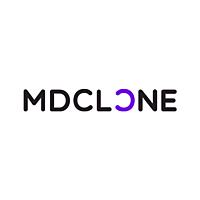Description

CA Test Data Manager

MDClone
Comprehensive Overview: CA Test Data Manager vs MDClone
CA Test Data Manager and MDClone are both solutions used for managing and generating data, but they serve different primary functions and cater to different target markets. Here's an overview of each:
CA Test Data Manager
a) Primary Functions and Target Markets:
-
Primary Functions: CA Test Data Manager (TDM) is a tool designed to streamline the process of test data creation, management, and provisioning. It focuses on providing high-quality test data that is safe (i.e., masked or anonymized) and on-demand for various testing environments. It supports synthetic data generation, data masking, data subsetting, and data discovery capabilities. The tool aims to increase testing efficiency and reduce the time to market for software applications.
-
Target Markets: Its primary target markets are large enterprises and organizations in sectors like finance, healthcare, retail, and telecommunications, where there is a critical need for data privacy compliance and robust testing environments.
b) Market Share and User Base:
- CA Test Data Manager, being a product from Broadcom after its acquisition of CA Technologies, enjoys a strong customer base due to its integration capabilities with existing enterprise systems and its comprehensive features tailored for large-scale data management needs. However, specific market share statistics can vary, and it's generally considered a strong player in the enterprise data management space without dominating it entirely.
c) Key Differentiating Factors:
-
Integration Capabilities: One of the key differentiators of CA TDM is its ability to integrate with a variety of enterprise systems and continuous integration/continuous deployment (CI/CD) pipelines, making it highly suitable for complex, large-scale enterprises.
-
Robust Data Masking and Subsetting: It provides advanced data masking and subsetting features, which are critical for compliance with data protection regulations like GDPR and HIPAA.
MDClone
a) Primary Functions and Target Markets:
-
Primary Functions: MDClone is a healthcare-focused data platform that enables data democratization while ensuring privacy through synthetic data generation. Its primary functions include allowing healthcare organizations to access, analyze, and use data without compromising patient privacy. It provides a solution for data-driven research, quality improvement, and operational planning.
-
Target Markets: MDClone primarily targets healthcare providers, research institutions, and public health organizations. Its tools are tailored to meet the challenges of handling sensitive health information and enabling data-driven insights in the healthcare sector.
b) Market Share and User Base:
- MDClone is emerging as a significant player in the healthcare data management and analytics space. While it may not yet have a market share comparable to long-standing general-purpose data management tools, its niche focus on healthcare gives it a strong and growing presence in that sector. It has been adopted by leading healthcare organizations around the world.
c) Key Differentiating Factors:
-
Synthetic Data Generation: MDClone’s ability to generate patient-like synthetic data sets it apart. This feature allows healthcare organizations to work with sensitive data without privacy concerns, facilitating research and analytics without risking patient confidentiality.
-
Healthcare Specialty: Unlike CA Test Data Manager, MDClone is specifically built for the healthcare industry, providing tailored solutions that address unique challenges, such as regulatory compliance and the sensitive nature of health data.
Overall Comparison
-
Functionality Focus: CA Test Data Manager serves broad enterprise needs with a strong emphasis on masking and subsetting for compliance across industries, while MDClone specializes in synthetic data for healthcare, prioritizing patient privacy and data accessibility.
-
Market Differentiation: CA TDM targets a broad set of industries, whereas MDClone is deeply embedded in the healthcare sector, giving it a niche market advantage.
-
Data Privacy and Security: Both products emphasize data privacy, but MDClone’s synthetic data approach provides an innovative way to maintain confidentiality in a sector critically dependent on trustworthy data handling.
Ultimately, the choice between these products would depend on the specific needs related to industry demands, the scale of operations, and the particular challenges regarding data privacy and usage within the organization.
Contact Info

Year founded :
Not Available
Not Available
Not Available
Not Available
Not Available

Year founded :
2015
+972 54-566-1331
Not Available
Israel
http://www.linkedin.com/company/mdclone
Feature Similarity Breakdown: CA Test Data Manager, MDClone
CA Test Data Manager (CA TDM) and MDClone are both designed to handle test data management and data anonymization or synthesis, but they cater to somewhat different needs within the data management space. Here's a feature similarity breakdown for both:
a) Core Features in Common
-
Data Anonymization and Masking: Both CA TDM and MDClone offer tools for anonymizing data to protect sensitive information and comply with data protection regulations like GDPR and HIPAA. They ensure that personal identifiers are masked or removed to safeguard privacy in test environments.
-
Data Synthesis: Both platforms can generate synthetic data. CA TDM uses its synthetic data generation to mimic the structure of production data, while MDClone is particularly focused on generating synthetic data for research and analytics without compromising patient privacy.
-
Data Subsetting: Both offer capabilities to subset large databases. This helps in creating smaller, more manageable sets of data that retain the essential characteristics of the original dataset.
-
Compliance Management: Both solutions provide features to help organizations stay compliant with regulatory requirements, specifically in terms of data privacy and security.
-
Integration Capabilities: Both can integrate with various databases and systems to pull in data for synthesis and anonymization, supporting a range of data environments common in enterprises.
b) User Interface Comparison
-
CA Test Data Manager:
- The UI of CA TDM is typically enterprise-focused, offering a highly functional interface with a comprehensive set of tools for managing various aspects of test data management. It tends to be feature-rich but may require a learning curve to navigate effectively due to its breadth of functionality.
- It includes dashboards and wizards that aid users in data masking, subsetting, and generation tasks, but its extensive options might be overwhelming for non-technical users.
-
MDClone:
- MDClone’s interface is designed to be more user-friendly, particularly focusing on ease of use for healthcare professionals and researchers who might not have a deep technical background.
- The platform provides intuitive data exploration and visualization tools that allow users to quickly generate, analyze, and synthesize data. Its streamlined interface is conducive to rapid data exploration and manipulation.
c) Unique Features
-
CA Test Data Manager:
- Broad Enterprise Focus: CA TDM is designed to support a wide range of industries beyond healthcare, providing a robust set of tools for data management tasks suitable for complex, multi-source environments.
- Integrated Test Data Tools: Offers more comprehensive test data preparation tools that go beyond anonymization and synthesis, such as end-to-end data management solutions for testing environments within large enterprises.
-
MDClone:
- Synthetic Data for Research: MDClone is particularly strong in generating synthetic data designed specifically for healthcare research. This capability allows for innovative research without the risk of patient data exposure.
- Patient Journey Analytics: It offers advanced tools to analyze complex patient journeys over time, enabling healthcare organizations to gain insights without compromising individual privacy.
Both platforms excel in their respective focused areas—CA TDM in multi-industry test data management and MDClone in healthcare-focused data synthesis and privacy. The choice between them would largely depend on the specific needs, such as industry focus or ease of use, within an organization.
Features

Not Available

Not Available
Best Fit Use Cases: CA Test Data Manager, MDClone
CA Test Data Manager (TDM) and MDClone are both tools designed to handle data, but they serve different primary functions and are suitable for various use cases within diverse industry verticals and company sizes. Here's a breakdown of their best fit use cases:
CA Test Data Manager (TDM)
a) For what types of businesses or projects is CA Test Data Manager the best choice?
CA Test Data Manager is primarily aimed at enterprises that need to create and manage test data for software development and quality assurance processes. The tool is particularly beneficial for:
- Large Enterprises or Complex IT Environments: Companies with extensive software development and testing requirements, such as those in the financial services, telecommunications, or retail industries, which require a rigorous and structured approach to testing.
- Regulated Industries: Organizations that must adhere to strict data privacy regulations (like GDPR, HIPAA) since CA TDM allows for creating synthetic or masked data to ensure compliance.
- Projects Needing High-Quality Test Data: Initiatives where the quality and realism of test data are critical to achieving valid test results, such as system integrations, user acceptance testing, or performance testing.
d) How do these products cater to different industry verticals or company sizes?
CA TDM is well-suited to industries like healthcare, finance, insurance, and telecom, where the quality, security, and compliance of test data are crucial. It scales effectively with larger organizations by providing comprehensive administration, data discovery, masking, and synthetic data generation tools to support sizeable and complex project requirements.
MDClone
b) In what scenarios would MDClone be the preferred option?
MDClone excels in healthcare and life sciences environments where data privacy, patient confidentiality, and data-driven insights are paramount. It's particularly favored in scenarios such as:
- Healthcare Providers and Researchers: Organizations that need to access and share health data for research without compromising patient privacy.
- Innovative Research Projects: Institutions or projects focusing on precision medicine, clinical trials, or public health that require rapid data access and manipulation without risking data breaches.
- Acceleration of Data-Driven Healthcare: Scenarios where organizations need to foster innovation and decision-making without the usual constraints of restrictive data sharing due to privacy concerns.
d) How do these products cater to different industry verticals or company sizes?
MDClone is highly specialized for the healthcare industry, including hospitals, research institutions, and biotech companies, providing unique data anonymization and synthetic data creation capabilities tailored for medical data. It fits well with both mid-sized and large healthcare organizations looking to leverage health data while maintaining strict compliance with privacy regulations.
In conclusion, CA Test Data Manager is broadly focused on enterprises seeking robust test data management across various industries, especially those with complex IT environments and regulatory needs. In contrast, MDClone is highly specialized for healthcare, providing tools for secure data utilization and innovation. The choice between them should rely on the specific needs regarding data handling, industry focus, and project objectives.
Pricing

Pricing Not Available

Pricing Not Available
Metrics History
Metrics History
Comparing teamSize across companies
Conclusion & Final Verdict: CA Test Data Manager vs MDClone
Sure, here is a conclusion and final verdict for CA Test Data Manager and MDClone, considering the factors you've mentioned:
Conclusion and Final Verdict
a) Best Overall Value
When evaluating CA Test Data Manager and MDClone based on overall value, it largely depends on the specific needs and priorities of the organization. If the focus is on robust test data management with comprehensive capabilities for data masking and generation, CA Test Data Manager offers significant value. On the other hand, if synthetic data generation, particularly for healthcare or research contexts where data privacy is paramount, is critical, MDClone stands out as the superior option.
b) Pros and Cons
CA Test Data Manager (CA TDM):
-
Pros:
- Comprehensive Test Data Capabilities: Provides extensive options for managing, masking, and generating test data across various scenarios.
- Integration: Seamlessly integrates with other tools and environments, enabling efficient workflows in development and testing practices.
- Data Compliance: Strong capabilities for ensuring compliance with data protection regulations through effective data masking.
-
Cons:
- Complexity: It can be complex to implement and may require significant resources and expertise to manage effectively.
- Cost: May involve higher upfront investment and ongoing costs compared to some other solutions.
MDClone:
-
Pros:
- Synthetic Data Generation: Specializes in creating synthetic data sets that maintain utility while safeguarding privacy, particularly valuable in healthcare and life sciences.
- Data Privacy: Excellent choice for organizations that prioritize data privacy and wish to minimize risks associated with real data usage.
- User-Friendly Interface: Offers an intuitive interface that may be easier for non-technical users to navigate.
-
Cons:
- Niche Focus: Primarily geared towards industries like healthcare, which may limit its versatility for other types of data management needs.
- Dependence on Synthetic Approach: May not meet all requirements where real data is necessary, particularly if synthetic data doesn't fully capture certain complexities.
c) Recommendations
For Users Trying to Decide:
- Assess Your Industry Needs: If you are in the healthcare or life sciences sectors, where data privacy and synthetic data generation are critical, MDClone would be more aligned with your needs.
- Consider Data Handling Requirements: For organizations focused on comprehensive test data management across various business areas, especially those requiring strong compliance measures, CA Test Data Manager could be more suitable.
- Evaluate Technical Expertise and Resources: Choose CA Test Data Manager if you have the technical expertise and resources to manage a more complex system. Opt for MDClone if you're looking for a more straightforward setup with strong support for data privacy.
- Budget Considerations: MDClone might offer more cost-effective solutions for organizations primarily interested in synthetic data, whereas CA Test Data Manager could be worth the investment for its comprehensive features and integration capabilities.
Ultimately, the decision should be guided by the specific data management needs, industry requirements, technical capabilities, and budget constraints of your organization. Testing both tools via demos or trials can be beneficial in making an informed choice.
Add to compare
Add similar companies



